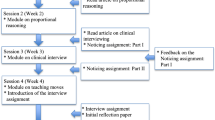Abstract
Student participation is an issue of equity. Without participation there can be no learning. This study focuses on the participation (and therefore learning) of struggling students (those with individual education plans [IEPs]) during the implementation of a relational thinking routine in a third-grade inclusion classroom. Students with IEPs often initially used direct modeling with linking cubes as a resource for presenting their thinking. In this way, they were able to demonstrate their ability to think relationally. As the year progressed, these students, who had earlier been reluctant to share and had done so only by using several of the resources that the participation structure of the routine provided, often showed a growth in their abilities to explain their thinking verbally.
Résumé
La participation des étudiants est une question d’équité. Sans participation aucun apprentissage n’est possible. Cette étude est centrée sur la participation (et donc l’apprentissage) d’étudiants qui éprouvent des difficultés d’apprentissage (ceux qui font l’objet de programmes de formation individuelle), lors de la mise en place d’une séquence structurée pour favoriser l’expression de la pensée relationnelle dans une classe d’intégration de troisième année. Au début, les élèves suivant un programme de formation individuelle utilisaient plus souvent les cubes ou d’autres modèles directs comme ressources pour représenter leur pensée. Ainsi, ils étaient en mesure de démontrer leur capacité de penser de façon relationnelle. Plus tard dans l’année scolaire, ces élèves, qui auparavant s’étaient montrés peu enclins à s’exprimer, et l’avaient fait seulement par le biais des ressources fournies par les séquences structurées prévues, ont dans plusieurs cas manifesté une meilleure capacité d’exprimer verbalement leur pensée.
Similar content being viewed by others
References
Allexsaht-Snider, M., & Hart, L. E. (2001). “Mathematics for all”: How do we get there? Theory Into Practice, 40(2), 93–101.
Baxter, J. A., Woodward, J., & Olson, D. (2001). Effects of reform-based mathematics instruction on low achievers in five third-grade classrooms. Elementary School Journal, 101(5), 529–547.
Boaler, J. (2006). How a detracked mathematics approach promoted respect, responsibility, and high achievement. Theory Into Practice, 45(1), 40–46.
Carpenter, T. P., Fennema, E., Franke, M., Levi, L., & Empson, S. (1999). Children’s mathematics: Cognitively guided instruction. Portsmouth, NH: Heinemann.
Carpenter, T. P., Franke, M., & Levi, L.(2003). Thinking mathematically: Integrating arithmetic and algebra in elementary school. Portsmouth, NH: Heinemann.
Cohen, E. (1984). Talking and working together: Status, interaction and learning. In P. L. Peterson, L. C. Wilkinson, & M. Hallinan (Eds.), Instructional groups in the classroom: Organization and processes (pp. 171–187). Orlando, FL: Academic.
Cohen, E., & Lotan, R. (1995). Producing equal-status interaction in the heterogeneous classroom. American Educational Research Journal, 32(1), 99–120.
Cohen, E., & Lotan, R. (1997). Raising expectations for competence: The effectiveness of status interventions. In E. Cohen & R. Lotan (Eds.), Working for equity in heterogeneous classroooms (pp. 77–91). New York, NY: Teachers College Press.
Dudley-Marling, C. (2004). The social construction of learning disabilities. Journal of Learning Disabilities, 37(6), 482–489.
Empson, S. B. (2003). Low-performing students and teaching fractions for understanding: An interactional analysis. Journal for Research in Mathematics Education, 34(4), 305–343.
Erickson, F. (1982). Classroom discourse as improvisation: Relationships between academic task structure and social participation structure in lessons. In L. C. Wilkinson (Ed.), Communicating in the classroom (pp. 153–181). New York, NY: Academic Press.
Falkner, K. P., Levi, L., & Carpenter, T. P. (1999). Children’s understanding of equality: A foundation for algebra. Teaching Children Mathematics, 6(4), 232–236.
Finn, J. D., & Cox, D. (1992). Participation and withdrawal among fourth-grade pupils. American Educational Research Journal, 29, 141–162.
Foote, M. Q. (2007, March). The influence of socio-cultural factors on students participation in mathematics. In D. Battey (Chair), Professional development at the intersection of mathematics and equity. Symposium conducted at the annual research pre-session of the National Council of Teachers of Mathematics, Atlanta, GA.
Gutiérrez, R. (2002). Enabling the practice of mathematics teachers in context: Toward a new equity research agenda. Mathematical Thinking and Learning, 4(2/3), 145–187.
Lave, J., & Wenger, E. (1991). Situated learning: Legitimate peripheral participation. Cambridge, England: Cambridge University Press.
McDermott, R., Goldman, S., & Varenne, H. (2006). The cultural work of learning disabilities. Educational Researcher, 35(6), 12–17.
Yackel, E., & Cobb, P. (1996). Sociomathematical norms, arguentation, and autonomy in mathematics. Journal for Research in Mathematics Education, 27(4), 458–477.
Author information
Authors and Affiliations
Corresponding author
Rights and permissions
About this article
Cite this article
Foote, M.Q., Lambert, R. I Have a Solution to Share: Learning Through Equitable Participation in a Mathematics Classroom. Can J Sci Math Techn 11, 247–260 (2011). https://doi.org/10.1080/14926156.2011.595882
Published:
Issue Date:
DOI: https://doi.org/10.1080/14926156.2011.595882




